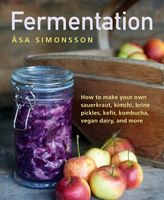Advertisement
Health Benefits of Ferments
Published 2019
It is important to remember that we are all different, and fermented foods will have different effects on different people. A very few people might find they are sensitive to fermented foods or have adverse reactions to them, something I will talk more about later. There are also differences between various fermented foods. The best way to be certain that you are consuming healthy fermented foods is to make them yourself. Some shop-brought products are very processed and may contain huge amounts of refined cooking salt – these are not healthy and I do not recommend you eat them. Pasteurised sauerkraut does not contain the healthy bacteria found in the homemade products, although they can still be a good food, and many commercial yogurts tested do not contain sufficient amounts of healthy bacteria to have the benefits we are after. The heavily promoted sugary pasteurised probiotic ‘health’ drinks you find on supermarket shelves will not do much for your gut flora. Evidence of this is demonstrated in a very interesting small study carried out by the BBC in the UK, on 30 people divided into three groups. For four weeks, group one was given an ‘off the shelf’ probiotic yogurt drink to take daily; group two drank kefir, a fermented unpasteurised dairy drink; and group three were instructed to eat foods high in prebiotics. Apart from this they were all following their usual diet. Their gut bacteria were tested before and after the four weeks. The result surprised the researchers. Group one didn’t show any significant increase in healthy bacteria, which tells us that these popular probiotic drinks can be a waste of money. Group three had a significant increase in a type of bacteria called Feacalibacterium. These bacteria help produce a substance called butyrate which helps feed the colon and is very good for inflammatory bowel diseases. Group two, however, had the biggest change of all the groups. They saw a rise in a whole range of Lactobacillus, known to be very good for gut health and for helping food intolerances. This was so mind-blowing for the researchers that they decided to look into fermented foods a bit more. They did some testing on various fermented foods, including traditionally homemade fermented foods that had not been pasteurised as well as some off-the-shelf versions from supermarkets. The study showed that the homemade fermented foods had several strains of beneficial bacteria whilst the shop-bought pasteurised foods had very little or none at all. So, in a nutshell, eating homemade fermented foods, including kefir and sauerkraut, may greatly enhance your gut health whilst bought fermented foods might not be as good value.

